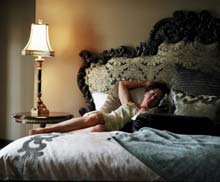Napping … Is it Good for You? Should You do It?
by www.SixWise.com
Giving in to a daytime catnap might have been frowned upon in the past, but now new research has put to bed previous nap naysayers. A new study has shown that a little daytime shuteye can actually provide health benefits.

This will give you just the right amount of sleep to feel energized instead of groggy. |
According to the November 2009 issue of the Harvard Health Letter, catching a daytime nap is a good way to catch up on the sleep you lose at night, sleep that may become more difficult as you age due to natural age-related decline in the quality of your nighttime sleep.©
Getting Over the Midafternoon Slump
The case of the drowsies may seem to hit the same time every afternoon and does so for several reasons. The first is a biological element. Your biological clock, located in the hypothalamus of your brain, is regulated and impacted by many physiological processes such as body temperature, blood pressure and secretion of digestive juices.
The circadian schedule, also referred to as the “internal body clock,” is naturally set to induce feelings of wakefulness during the day that gradually slow down and turn to sleepiness at nighttime. Oftentimes, it’s common to experience feelings of midafternoon sleepiness as a part of the circadian schedule.
Waking hours is the other factor to daytime sleepiness. For example, if you work a night shift and find yourself having difficulty falling asleep the next night it could be due to a disruption in your circadian rhythm, resulting from your 16 hours of wakefulness beginning earlier and ending earlier -- causing you to feel drowsy in the late afternoon or early evening hours.
Power Naps at Work can Increase Productivity
Just taking a six-minute nap can help with information retention and memorization. In addition, research has shown that a nap improves:
-
Learning
-
Memory
-
Creative thinking
-
Problem solving
Some companies have jumped on the nap “wagon” and consider napping a strategic company move, even going so far as to designate nap rooms for their employees.
Another recent study showed the benefits a planned 40-minute nap had on improving the alertness and performance of air traffic controllers working the night shift. Currently, research is in the works to improve the sleep policies of fire departments as well.
Some experts, however, still continue to believe that daytime naps may steal hours from nighttime sleep. They recommend if you do take daytime naps to take them in the midafternoon and limit them to 30 minutes.
Other Countries Embrace Benefits of Daytime Siestas
Taking an after lunch nap in other countries like Portugal, Spain, many Latin American countries, the Philippines, China, Italy, India, the Middle East and North Africa is commonplace and encouraged. Some countries like Argentina take naps very seriously and have a reserved time of the day for siestas that is considered a sacred time. And it’s not unusual for an employee in Japan to take a nap in a “napping room” or at their “desk pillow” during office hours.
Another study conducted in Greece showed the more people napped, the lower their risk of dying from heart disease and stroke.
Specific study findings touting the benefits of napping include:
-
People who napped regularly during the day for at least 30 minutes three times a week or more had a 37 percent lower risk of coronary mortality than those who did not sleep during the day
-
The strongest link between lower coronary mortality and napping during the day was found among working men
-
Even people who napped occasionally had a 12 percent lower coronary mortality compared to those people who did not nap at all
Top Napping Tips
If you are looking for the best way to take a nap, here are some tips to get the most out of your daytime naps:
-
Set a timer or alarm for 30 minutes: This is the ideal amount of time for your body to reenergize and relax. A nap any longer than 30 minutes will put you in a deeper sleep cycle, causing feelings of grogginess and making it harder to focus and concentrate once you awake.
-
Create an ideal nap area: Be sure that the room is dark, free of distractions and at a comfortable temperature. You can use eye shades and relaxing music, such as the highly recommended Sleep Easy CD, to help you fall asleep faster.
-
Schedule your nap time: Don’t wait until you’re ready to topple over from exhaustion, or worse get behind the wheel to drive home, before you take your nap. If you start taking naps at the same time and for the same duration each day, your body will have an easier time adjusting.
-
Drop any guilty feelings: Instead of thinking of yourself as lazy, think of how much more productive and alert you will be after napping.
American Sleep Habits
The reasons for sleep deprivation among Americans runs the gamut from kids, work, stress, and even addictions to the Internet. According to a survey conducted by the Centers for Disease Control and Prevention, more than 1 out of 10 people admitted to not getting enough sleep in the past 30 days, and the part of the country feeling the most sleep-deprived are those on the east coast.
Other findings from the survey broke down who is and who isn’t getting enough sleep:
-
Hispanics slept better than whites or blacks
-
Men slept better than women
-
A whopping 25.8 percent of people who were unable to work said they had not gotten a single night's good rest in the previous month
-
13.9 percent of unemployed people also said they hadn’t gotten a good night’s sleep in the past month, compared to 9.9 percent of people with jobs and 11.1 percent of students and homemakers
And by state the Westerners are sleeping more sound than those on the East Coast:
They were followed by:
-
Tennessee: 14.8 percent have been sleep deprived for the past month
-
Kentucky: 14.4 percent
-
Oklahoma: 14.3 percent
-
Californians: 8 percent
-
North Dakotans: 7.4 percent
-
12 of the 14 best-sleeping states were west of the Mississippi
Authors of the survey attribute the struggles in the Southeastern U.S. with getting a good night’s sleep to having a higher rate of obesity, hypertension and other chronic diseases.
9 Tips to Getting a Good Night’s Sleep Tonight
Sleep Easy With the Ultimate Soothing Music and Meditation CD on the Market!

With guided sleep meditations by leading meditation expert Mary Maddux and music by a renowned meditation music composer with 20 years experience, this CD will help you find deep rest and sleep ... at an incredible price.
Sleep Easy CD users have reported:
- Falling asleep faster
- Waking up less throughout the night
- Falling back to sleep faster when awakened during the night
- Feeling more rested the next morning
Some Recent Testimonials
"I was surprised by how quickly I drifted off to sleep ... The music is phenomenal, ethereal. Mary's voice has a musical, relaxing and trance-inducing quality. There was a difference, also, in the quality of my sleep. Upon awakening, I felt more rested." --SR, Mother, CA
"I fell asleep more easily with the CD--not sleeping with all this stuff on my mind and all the unfinished business of the day. The music is relaxing, calming, nurturing ... " --Kitty Alder, Energy Consultant, NE
|
If you’re feeling more irritable than usual and are having trouble concentrating on minor tasks, there’s a good chance that you aren’t getting enough hours of sleep each night. Work stressors, taking care of the kids, finances or piling up household responsibilities all can contribute to sleep interference that can go on to affect your daily living.
Some of these factors may be out of your control, but adopting a good nighttime routine and healthy sleep habits can help you fall asleep and stay asleep.
-
Keep the same bedtime schedule during the week and the weekends—Get to bed and wake up at the same time each day and resist the temptation to sleep in on the weekends. By putting your body on the same sleep schedule, your body sleep-wake schedule will become regulated and apt to fall asleep easier at night.
-
Stay away from nicotine, caffeine and alcohol in the evening hours—Caffeine and its stimulant effects can take hours to completely clear out of your system. Plan on avoiding any kind of caffeine for up to eight hours before bedtime or risk staying up most of the night. If you smoke, try to avoid smoking in the evening or close to bedtime due to the withdrawal effects you may experience when you go to bed, which may keep you awake. Avoid drinking alcohol before going to bed. Even though alcohol is a sedative, once its effects wear off you may experience a fitful quality of sleep. Alcohol has also been known to cause sleep apnea.
-
Get regular exercise—Daily exercise, particularly a cardiovascular exercise workout, will help you unwind at the end of the day, lessen the amount of time it takes you to fall asleep and enable your body to stay asleep. Be careful not to exercise too close to your bedtime as you might experience the opposite effect and not be able to get to sleep.
-
Make your bedroom an ideal environment for sleeping—Keep the room dark, eliminate any outside noise and the temperature cool. If you live by a busy street, you can keep noise levels down with a fan or sound machine. For any pesky light like a street lamp shining through your window you can try using an eye mask or blackout curtains.
-
Night shift workers need to adjust the room to mimic nighttime—Keep your shades down and light out. You can use darkening curtains and an eye mask to prevent sunlight from coming in. Cut out any potential distractions by turning off your phone, telling your friends and relatives not to call you during your sleep time and schedule any appointments so they don’t interfere with your sleep time.
-
Choose a comfortable mattress and pillow—You spend a substantial portion of your life sleeping, so you’ll want to make sure you are sleeping on a comfortable mattress and pillow. Take an inventory of your bedding and determine if your sheets are comfortable or too scratchy and if your mattress is firm enough or too firm then make some changes accordingly. Try out different pillows such as ones for side, back or stomach sleepers designed to fit your sleep style. Limit the amount of time children and pets share the bed with you as they are often disruptive to the sleep for everyone.
-
Stick to the same bedtime routine each night—Follow the same relaxing bedtime ritual each night to help your body prepare for sleep. You can add relaxing activities such as taking a warm bath or shower, meditational yoga, reading a book or listening to some peaceful music. At SixWise, we love the Sleep Easy CD to help us "shift gears" and relax into sleep.
-
Don’t try to force sleep if you’re not tired—If you go to bed and find you can’t fall asleep after 15 to 20 minutes, get up, try some meditation techniques or deep breathing and go back to bed when you start to feel tired. Stressing yourself out over not being able to get to sleep only produces anxiety and will prevent you from sleeping.
Recommended Reading
Sleep Apnea: The Silent Killer That Can Raise Your Death Risk 46 Percent
Tired all the Time? Eight Medical Issues to be Aware Of
17 Tips for Healthy and Peaceful Sleep … Including 6 You May Not Know Of
Sources
Harvard Health Publication November 2009
Medical News Today
Health.com October 30, 2009
Mayo Clinic
Spine Health
HelpGuide.org